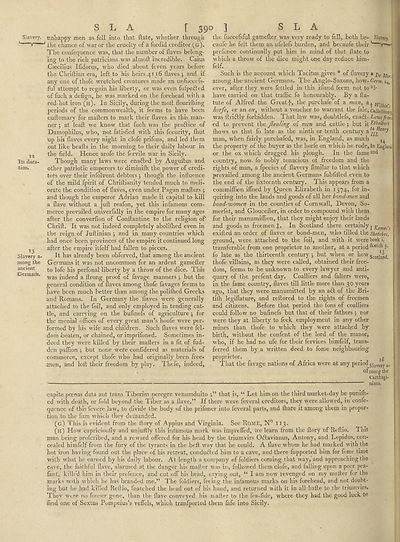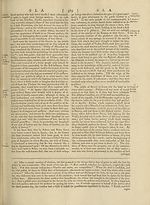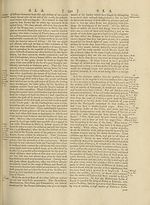Encyclopaedia Britannica, or, a Dictionary of arts, sciences, and miscellaneous literature : enlarged and improved. Illustrated with nearly six hundred engravings > Volume 19, Scripture-SUG
(434) Page 390 - SLA
Download files
Complete book:
Individual page:
Thumbnail gallery: Grid view | List view

SLA f 39° ] SLA
Slavery.
ta
Its dura¬
tion.
13
Slavery a-
mong the
ancient
Germans.
ttnliappy men as fell into that Hate, whether through
the chance of war or the cruelty of a fordid creditor (g).
The confequence was, that the number of flaves belong¬
ing to the rich patricians was almoft incredible. Caius
Csecilius Ifidorus, who died about feven years before
the Chriftian era, left to his heirs 4116 (laves ; and if
any one of thofe wretched creatures made an unfuceefs-
ful attempt to regain his liberty, or was even fufpe&ed
of fuch a defign, he was marked on the forehead with a
red-hot iron (h). In Sicily, during the molt flourifhing
periods of the commonwealth, it feems to have been
cuftomary for mafters to mark their (laves in this man¬
ner ; at lead wTe know that fuch was the pradlice of
Damophilus, who, not fatisfied with this fecurity, (hut
up his (laves every night in clofe prifons, and led them
out like beads in the morning to their daily labour in
the field. Hence arofe the fervile war in Sicily.
Though many laws were enafted by Augudus and
other patriotic emperors to diminifh the power of credi¬
tors over their infolyent debtors j though the influence
of the mild fpirit of Chridianity tended much to meli¬
orate the condition of (laves, even under Pagan maders j
and though the emperor Adrian made it capital to kill
a (lave without a jud reafon, yet this infamous com¬
merce prevailed univerfally in the empire for many ages
after the converfion of Condantine to the religion of"
Chrid. It was not indeed completely abolifhed even in
the reign of Judinian j and in many countries which
had once been provinces of the empire it continued long
after the empire itfelf had fallen to pieces.
It has already been obferved, that among the ancient
Germans it was not uncommon for an ardent gameder
to lofe his perfonal liberty by a throw of the dice. This
was indeed a drong proof of favage manners j but the
general condition of (laves among thofe favages feems to
have been much better than among the polifhed Greeks
and Romans. In Germany the (laves were generally
attached to the foil, and only employed in tending cat¬
tle, and carrying on the bufinefs of agriculture j for
the menial offices of every great man’s houfe were per¬
formed by his wife and children. Such (laves w^ere fel-
dom beaten, or chained, or imprifoned. Sometimes in¬
deed they were killed’ by their maders in a fit of hid¬
den paffion ; but none were confidered as materials of
commerce, except thofe who had originally been free¬
men, and lod their freedom by play. Thefe, indeed,
the fuccefsful gameder was very ready to fell, both be- Slavery,
caufe he felt them an ufelefs burden, and becaufe their
prefence continually put him in mind of that date to
which a throw of the dice might one day reduce him-
felf.
Such is the account which Tacitus gives * of (lavery * j)e ^ |
among the-ancient Germans. The Anglo-Saxons, how- Genn. 24, j
ever, after they were fettled in this illand feem not to2S-
have carried on that traffic fo honourably. By a da-
tute of Alfred the Greatf, the purchafe'of a man, a^. linkin'
horfe, or an ox, without a voucher to warrant the fale, Cs!leclion'\\
wras driclly forbidden. That law was, doubtlefs, ena£t- Luwsfrw'
ed to prevent the Jlealing of men and cattle ; but it Seibert
(hows us that fo late as the ninth or tenth century a^^
man, when fairly purchafed, was, in England, as much ’ j4
the property of the buyer as the horfe on which he rode, In Englaik,
or the ox which dragged his plough. In the fameatl(l
country, now- fo nobly tenacious of freedom and the
rights of man, a fpecies of (lavery fimilar to that which
prevailed among the ancient Germans fubfided even to
the end of the (ixteenth century. This appears from a
commiffion iffued by Queen Elizabeth in 1574, for in¬
quiring into the lands and goods of all her bond-men and
bond-women in the counties of Cornwall, Devon, So-
merfet, and Glouceder, in order to compound with them
for their manumiffion, that they might enjoy their lands
and goods as freemen J. In Scotland there certainly ^ ,
exided an order of (laves or bond-men, who tilled the Sketches*
ground, were attached to the foil, and with it were book i.
transferable from one proprietor to another, at a period ^etch j. |
fo late as the thirteenth century ; but when or how Scotland. '
thofe villains, as they were called, obtained their free¬
dom, feems to be unknown to every lawyer and anti¬
quary of the prefent day. Coalliers and falters were,
in the fame country, (laves till little more than 30 years
ago, that they were manumitted by an aft of the Bri-
tiffi legiflature, and redored to the rights of freemen
and citizens. Before that period the fons of coalliers
could follow no bufinefs but that of their fathers ; nor
were they at liberty to feek employment in any other
mines than thofe to which they were attached by
birth, without the confent of the lord of the manor,
who, if he had no ufe for their fervices himfelf, trans¬
ferred them by a written deed to feme neighbouring
proprietor. »
That the favage nations of Africa were at any period sj3Very '
of rnong the I
Carthagi-
i nians.
capite poenas data aut trans Tiberim peregre venumduito that is, “ Let him on the third market-day be punifli-
ed with death, or fold beyond the Tiber as a Have.” If there wrere feveral creditors, they were allowed, in confe¬
quence of this fevere law, to divide the body of the prifoner into feveral parts, and (hate it among them in propor¬
tion to the fum which they demanded.
(g) This is evident from the (lory of Appius and Virginia. See Rome, N° 113.
(h) How capricioufiy and uniullly this infamous mark was impreffed, we learn (rom the (lory of Reftio. This
man being profcribed, and a reward offered for his head by the triumvirs Oftavianus, Antony, and Lepidus, con¬
cealed himfelf from the fury of the tyrants in the bed way that he could. A (lave whom he had marked with the
hot iron having found out the place of his retreat, condufted him to a cave, and there fupported him for feme time
with what he earned by his daily labour. At length a company of foldiers coming that way, and approaching the
cave, the faithful (lave, alarmed at the danger his mafier was in* followed them clofe, and falling upon a poor pea-
fant, killed him in their prefence, and cut off his head, crying out, “ I am now revenged on my mailer for the
marks with which he has branded me.” The foldiers, fet ing the infamous marks on his forehead, and not doubt¬
ing but he had killed Reftio, fnatehed the head out of his hand, and returned with it in all hade to the triumvirs.
They were no fooner gone, than the (lave conveyed his n.after to the fea-fide, where they had the good luck to
nnd one of Sextus Pompeius’s veffels, which tranfported them fafe into Sicily.
Slavery.
ta
Its dura¬
tion.
13
Slavery a-
mong the
ancient
Germans.
ttnliappy men as fell into that Hate, whether through
the chance of war or the cruelty of a fordid creditor (g).
The confequence was, that the number of flaves belong¬
ing to the rich patricians was almoft incredible. Caius
Csecilius Ifidorus, who died about feven years before
the Chriftian era, left to his heirs 4116 (laves ; and if
any one of thofe wretched creatures made an unfuceefs-
ful attempt to regain his liberty, or was even fufpe&ed
of fuch a defign, he was marked on the forehead with a
red-hot iron (h). In Sicily, during the molt flourifhing
periods of the commonwealth, it feems to have been
cuftomary for mafters to mark their (laves in this man¬
ner ; at lead wTe know that fuch was the pradlice of
Damophilus, who, not fatisfied with this fecurity, (hut
up his (laves every night in clofe prifons, and led them
out like beads in the morning to their daily labour in
the field. Hence arofe the fervile war in Sicily.
Though many laws were enafted by Augudus and
other patriotic emperors to diminifh the power of credi¬
tors over their infolyent debtors j though the influence
of the mild fpirit of Chridianity tended much to meli¬
orate the condition of (laves, even under Pagan maders j
and though the emperor Adrian made it capital to kill
a (lave without a jud reafon, yet this infamous com¬
merce prevailed univerfally in the empire for many ages
after the converfion of Condantine to the religion of"
Chrid. It was not indeed completely abolifhed even in
the reign of Judinian j and in many countries which
had once been provinces of the empire it continued long
after the empire itfelf had fallen to pieces.
It has already been obferved, that among the ancient
Germans it was not uncommon for an ardent gameder
to lofe his perfonal liberty by a throw of the dice. This
was indeed a drong proof of favage manners j but the
general condition of (laves among thofe favages feems to
have been much better than among the polifhed Greeks
and Romans. In Germany the (laves were generally
attached to the foil, and only employed in tending cat¬
tle, and carrying on the bufinefs of agriculture j for
the menial offices of every great man’s houfe were per¬
formed by his wife and children. Such (laves w^ere fel-
dom beaten, or chained, or imprifoned. Sometimes in¬
deed they were killed’ by their maders in a fit of hid¬
den paffion ; but none were confidered as materials of
commerce, except thofe who had originally been free¬
men, and lod their freedom by play. Thefe, indeed,
the fuccefsful gameder was very ready to fell, both be- Slavery,
caufe he felt them an ufelefs burden, and becaufe their
prefence continually put him in mind of that date to
which a throw of the dice might one day reduce him-
felf.
Such is the account which Tacitus gives * of (lavery * j)e ^ |
among the-ancient Germans. The Anglo-Saxons, how- Genn. 24, j
ever, after they were fettled in this illand feem not to2S-
have carried on that traffic fo honourably. By a da-
tute of Alfred the Greatf, the purchafe'of a man, a^. linkin'
horfe, or an ox, without a voucher to warrant the fale, Cs!leclion'\\
wras driclly forbidden. That law was, doubtlefs, ena£t- Luwsfrw'
ed to prevent the Jlealing of men and cattle ; but it Seibert
(hows us that fo late as the ninth or tenth century a^^
man, when fairly purchafed, was, in England, as much ’ j4
the property of the buyer as the horfe on which he rode, In Englaik,
or the ox which dragged his plough. In the fameatl(l
country, now- fo nobly tenacious of freedom and the
rights of man, a fpecies of (lavery fimilar to that which
prevailed among the ancient Germans fubfided even to
the end of the (ixteenth century. This appears from a
commiffion iffued by Queen Elizabeth in 1574, for in¬
quiring into the lands and goods of all her bond-men and
bond-women in the counties of Cornwall, Devon, So-
merfet, and Glouceder, in order to compound with them
for their manumiffion, that they might enjoy their lands
and goods as freemen J. In Scotland there certainly ^ ,
exided an order of (laves or bond-men, who tilled the Sketches*
ground, were attached to the foil, and with it were book i.
transferable from one proprietor to another, at a period ^etch j. |
fo late as the thirteenth century ; but when or how Scotland. '
thofe villains, as they were called, obtained their free¬
dom, feems to be unknown to every lawyer and anti¬
quary of the prefent day. Coalliers and falters were,
in the fame country, (laves till little more than 30 years
ago, that they were manumitted by an aft of the Bri-
tiffi legiflature, and redored to the rights of freemen
and citizens. Before that period the fons of coalliers
could follow no bufinefs but that of their fathers ; nor
were they at liberty to feek employment in any other
mines than thofe to which they were attached by
birth, without the confent of the lord of the manor,
who, if he had no ufe for their fervices himfelf, trans¬
ferred them by a written deed to feme neighbouring
proprietor. »
That the favage nations of Africa were at any period sj3Very '
of rnong the I
Carthagi-
i nians.
capite poenas data aut trans Tiberim peregre venumduito that is, “ Let him on the third market-day be punifli-
ed with death, or fold beyond the Tiber as a Have.” If there wrere feveral creditors, they were allowed, in confe¬
quence of this fevere law, to divide the body of the prifoner into feveral parts, and (hate it among them in propor¬
tion to the fum which they demanded.
(g) This is evident from the (lory of Appius and Virginia. See Rome, N° 113.
(h) How capricioufiy and uniullly this infamous mark was impreffed, we learn (rom the (lory of Reftio. This
man being profcribed, and a reward offered for his head by the triumvirs Oftavianus, Antony, and Lepidus, con¬
cealed himfelf from the fury of the tyrants in the bed way that he could. A (lave whom he had marked with the
hot iron having found out the place of his retreat, condufted him to a cave, and there fupported him for feme time
with what he earned by his daily labour. At length a company of foldiers coming that way, and approaching the
cave, the faithful (lave, alarmed at the danger his mafier was in* followed them clofe, and falling upon a poor pea-
fant, killed him in their prefence, and cut off his head, crying out, “ I am now revenged on my mailer for the
marks with which he has branded me.” The foldiers, fet ing the infamous marks on his forehead, and not doubt¬
ing but he had killed Reftio, fnatehed the head out of his hand, and returned with it in all hade to the triumvirs.
They were no fooner gone, than the (lave conveyed his n.after to the fea-fide, where they had the good luck to
nnd one of Sextus Pompeius’s veffels, which tranfported them fafe into Sicily.
Set display mode to:
![]() Universal Viewer |
Universal Viewer | ![]() Mirador |
Large image | Transcription
Mirador |
Large image | Transcription
Images and transcriptions on this page, including medium image downloads, may be used under the Creative Commons Attribution 4.0 International Licence unless otherwise stated. ![]()
| Permanent URL | https://digital.nls.uk/192700924 |
|---|
| Attribution and copyright: |
|
|---|
| Description | Ten editions of 'Encyclopaedia Britannica', issued from 1768-1903, in 231 volumes. Originally issued in 100 weekly parts (3 volumes) between 1768 and 1771 by publishers: Colin Macfarquhar and Andrew Bell (Edinburgh); editor: William Smellie: engraver: Andrew Bell. Expanded editions in the 19th century featured more volumes and contributions from leading experts in their fields. Managed and published in Edinburgh up to the 9th edition (25 volumes, from 1875-1889); the 10th edition (1902-1903) re-issued the 9th edition, with 11 supplementary volumes. |
|---|---|
| Additional NLS resources: |
|

